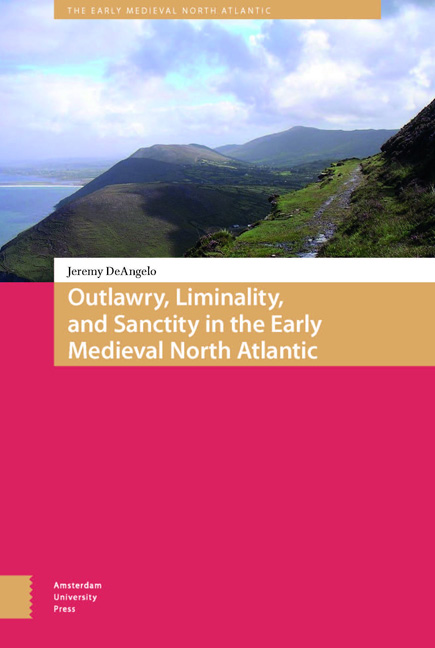Book contents
- Frontmatter
- Dedication
- Contents
- Acknowledgements
- Introduction: The Hermit and the Outlaw
- 1 Outlawry and Liminality in the North Atlantic
- 2 Imitating Exile in Early Medieval Ireland
- 3 Lessons of Conduct in Anglo-Saxon England
- 4 The Transgressive Hero
- 5 Cultural Exchange at the Boundaries of the Far North
- 6 Transgression in Transition after the Norman Conquest
- Bibliography
- Index
4 - The Transgressive Hero
Published online by Cambridge University Press: 16 February 2021
- Frontmatter
- Dedication
- Contents
- Acknowledgements
- Introduction: The Hermit and the Outlaw
- 1 Outlawry and Liminality in the North Atlantic
- 2 Imitating Exile in Early Medieval Ireland
- 3 Lessons of Conduct in Anglo-Saxon England
- 4 The Transgressive Hero
- 5 Cultural Exchange at the Boundaries of the Far North
- 6 Transgression in Transition after the Norman Conquest
- Bibliography
- Index
Summary
Holy Wreccan
Unlike the other two North Atlantic cultures in this book, there was no definitive ‘outlaw tradition’ among the Anglo-Saxons. Figures such as Beowulf, the Wanderer, or the Seafarer may share some qualities with outlaws, but their overlap is far from complete, and as we have seen in Chapter 1 it would be reductive to claim that wrecca is perfectly translated as outlaw. As a result, the literary dimension of the outlaw in Anglo-Saxon England can be said to be lacking. However, as with the Irish, there is an additional sphere within Anglo-Saxon society where the qualities of the outlaw found expression – in the practice and depiction of Christian asceticism in the North Atlantic. Ailithre was a repurposing of criminal punishment for penance that redefined the categories of illicit and righteous action. The same can be said of the actors. The liminal power accessed by the outlaw was valuable as capital to spiritual leaders as much as it was to secular. Add to this the mandate of Christianity to embrace the despised and reject worldly authority, and an affinity for outlawry appears almost natural to ascetic forms of the faith. The Anglo-Saxon corpus, while lacking secular outlaw heroes, contains many saintly heroes who reflect outlaw tropes in this way. How these two modes of life intertwine and diverge is seen most clearly in the career of Guthlac, hermit of Crowland, who in the course of his life was both an outlaw and an ascetic. In examining the works that feature him one is able to gain a better idea of how holiness and criminality could intersect in the early medieval North Atlantic. Moreover, it is through figures such as Guthlac – their abilities both amplified and sanctioned by God's favor – that one can see just how transformational an outsider can be due to the liminal power he or she represents. Of course, as we have seen, the application of the influence borne of foreign engagement provoked controversy easily; also seen in the Guthlac tradition is how the principle of conduct once again governs the correct usage of foreign expertise within North Atlantic literature.
- Type
- Chapter
- Information
- Publisher: Amsterdam University PressPrint publication year: 2018



